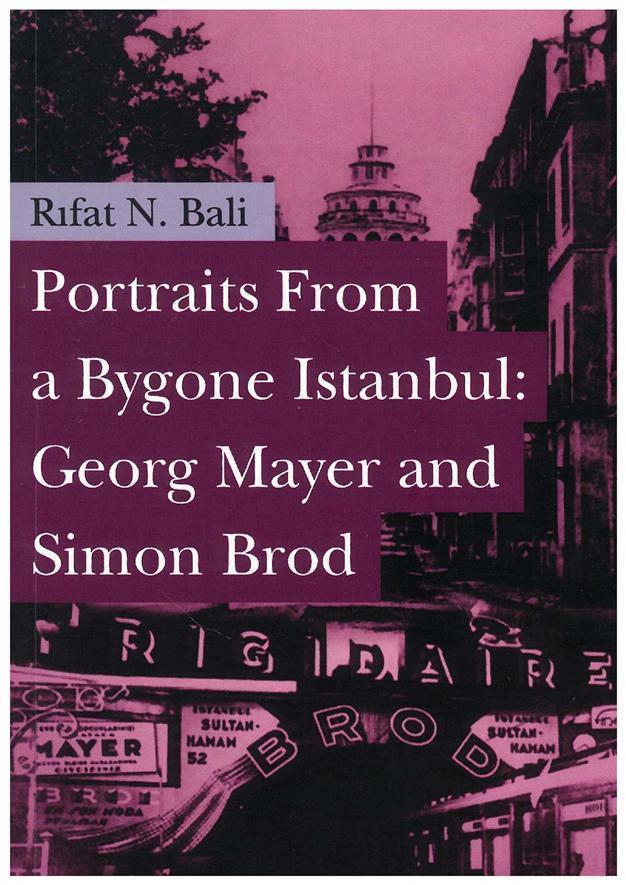Portraits From a Bygone Istanbul: Georg Mayer and Simon Brod
William Armstrong - william.armstrong@hdn.com.tr
 'Portraits From a Bygone Istanbul: Georg Mayer and Simon Brod' by Rifat N. Bali (Libra Kitap, 2010, 20TL, pp 120)
'Portraits From a Bygone Istanbul: Georg Mayer and Simon Brod' by Rifat N. Bali (Libra Kitap, 2010, 20TL, pp 120)The two brief biographies included in this volume are the result of some heroic digging around little-known archives by the author. Rıfat Bali has done this for a number of semi-academic books in recent years, but the subject of “Portraits From a Bygone Istanbul...” is rather more enticing than most of the others (I can’t say my mouth waters at the prospect of “An Overview of the Turkish Press through the Reports of American Diplomats: 1925-1962”). Although only given a tiny print run in English, it is a noble attempt to recover from obscurity two remarkable individuals, figures from a once-thriving Jewish Istanbul that has now all but vanished.
Georg Mayer was of Ashkenazi heritage, his grandfather having migrated from Vienna during the 19th century. The first “Mayer’s” department store was first established in the Galata district of Istanbul in 1867, and was subsequently relocated to today’s İstiklal Caddesi (No. 377-379 – sadly no longer there). Devoted entirely to the sale of ready-to-wear clothes, it became something of an Istanbul institution, cashing in on the growing fashion for western dress in the late-Ottoman period.
Mayer became the reluctant inheritor of the store at some point in the early 20th century. “Steeped in French, Italian, British, German or Austrian culture,” he moved easily between the various local communities, a member of that vanished cosmopolitan bourgeoisie which ultimately couldn’t long survive the transformation from Empire to Republic. He was the kind of individual whose smoking method could be described as “the very definition of charisma,” and who hosted monthly gatherings that “tended to be philosophical in nature” with “persons of quality” With the coming of the Turkish Republic, however, business became increasingly difficult for his store, and Mayer eventually moved away to his ancestral home of Vienna, where he married for a second time and died in 1974.
In many ways, Simon Brod was an even more intriguing man. Born in Istanbul in 1893, his father had emigrated from Russia, with a family background also in textiles (production, rather than sales). It was the fortune earned in this professional life that made Brod’s remarkable activities during the Second World War possible. As Europe fell under Nazi control, Istanbul became one of the main transit points for the desperate refugees spilling out. For these, Brod became a one-man Jewish rescue committee, overtly and covertly greasing every official wheel, paying bribes, faking passports, and offering aid. He knew every stone in Istanbul, and more importantly how to turn them for the benefit of destitute new migrants. His Suadiye kitchen was permanently filled with penniless, helpless, homeless refugees, cooked for by his wife Evy and their daughter. The phone would ring at 3 a.m. and Brod would be off to meet a train or boat or car, following a tip-off that new arrivals were expected. All this was done for no personal benefit at all, entirely at his own expense, and always under the considerable threat of the authorities, which did not look kindly upon such activity.
Nevertheless, what makes Brod all the more fascinating is the fact that by no means was he a pure-as-driven-snow saint, despite his superhuman efforts during the war. One who knew him well at the time is quoted as describing his character thus:
He doesn’t have the slightest trace of love for these refugees. He is a demonic force; he wants to do this work; in many ways, he is a giant, but there needs to be someone else that will stand beside him and perform the humanitarian tasks. He needs to [be the one to] give bribes, that’s his business; he needs to [be the one to] arrange matters with the police. He’ll slap a police officer on the face and he’ll thank him. He runs and he makes the rounds, always running here and there, he crudely abuses the refugees.
Another recalls that Brod was “suspicious to the point of paranoid when it came to the evil and inhumanity that others were capable of, especially when it came to Jewish refugees.” Ultimately, he was a hugely conflicted individual, a temperamental combination of cynicism and pure idealism.
It’s easy to be nostalgic, and perhaps it’s because what they represent no longer exists that Mayer and Brod appear so romantic to us today. Still, it’s rare in our age to come across characters quite so vivid and attractive as the two men who emerge from these pages.
Released this week

‘The Last Lion: Winston Spencer Churchill: Defender of the Realm, 1940-1965’ by William Manchester and Paul Reid
Hardcover, Little Brown, $40.00, pp 1232










